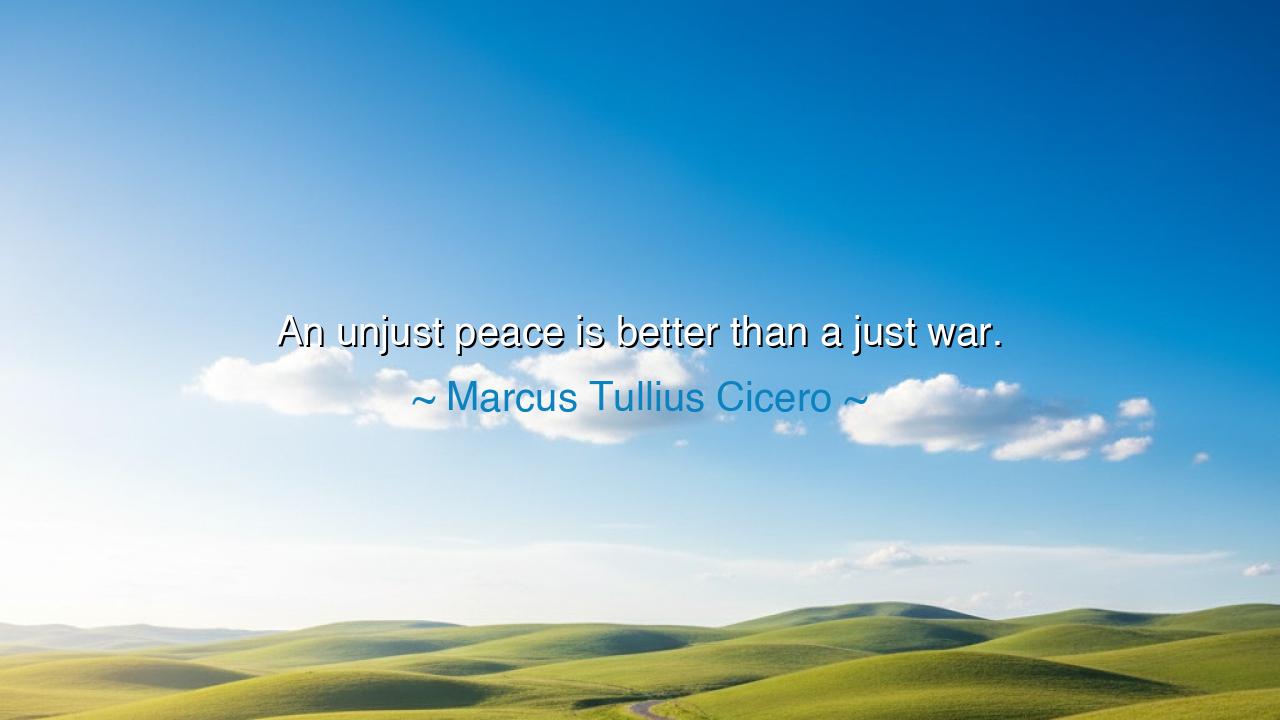
An unjust peace is better than a just war.






Hear the solemn wisdom of Marcus Tullius Cicero, the Roman orator and philosopher, who declared: “An unjust peace is better than a just war.” These words carry the weight of centuries, forged in the fires of empire and spoken by one who knew both the triumphs and the betrayals of politics. In this declaration lies a truth as difficult as it is profound: that even when peace is imperfect, even when it falls short of justice, it spares the world the devastation that war surely brings. For war, no matter how righteous in intent, leaves only ashes in its wake.
The origin of this saying rests in Cicero’s life and times. Rome in his age was torn by civil wars, conspiracies, and the ambitions of generals who sought power through blood. Cicero himself was often caught in the whirlwind—sometimes standing for the republic, sometimes forced into silence, and at last betrayed by those he had sought to defend. He saw clearly that war rarely ends where it begins, and that what men call “just” in battle soon collapses into cruelty and ruin. His words are not those of cowardice, but of a man who understood the high price of violence and the fragility of civilization.
History offers many examples that confirm Cicero’s warning. Consider the Treaty of Westphalia in 1648, which ended the Thirty Years’ War. The peace it brought was imperfect, leaving disputes unresolved and injustices unhealed. Yet it was better than the war that had consumed Europe, reducing cities to rubble, fields to wastelands, and millions of souls to dust. The peace may not have been just, but it ended the slaughter—and in that, it was greater than any “just” cause that might have prolonged the fighting.
Or think of Abraham Lincoln, who during the American Civil War longed for reconciliation, even at the cost of compromise. His famous call, “With malice toward none, with charity for all,” reveals the same spirit as Cicero’s maxim. For even when justice demanded retribution, Lincoln knew that the nation’s healing required mercy more than vengeance. Better an imperfect peace, marred by wounds not fully closed, than a “just war” dragged on until the land was bled dry.
Yet let us not mistake Cicero’s teaching. He does not say that justice is unimportant, nor that peace purchased by betrayal is noble. He speaks instead to the terrible truth that war consumes all that it touches, including the very justice for which it was begun. What begins as a righteous cause can descend into hatred, cruelty, and destruction beyond imagining. An unjust peace, though bitter, at least preserves life and creates the possibility for future healing. A just war, once unleashed, may burn away both justice and peace alike.
The lesson for us is clear: seek peace before you seek victory. In disputes, whether between nations, neighbors, or within your own heart, choose first the path that spares life, even if it does not give you all that you desire. Guard against the pride that demands perfect justice at once, for such pride often leads to destruction. Instead, sow peace, even if it is partial, even if it is imperfect, for from that soil reconciliation may grow.
Therefore, remember Cicero’s words: “An unjust peace is better than a just war.” Hold them not as an excuse for cowardice, but as a call to humility and restraint. In your own conflicts, ask yourself: is it better to win by destruction, or to live by compromise? Is it better to hold onto grievance, or to accept imperfect reconciliation? Choose the latter, for life preserved is greater than any victory won in ashes. And know this: in preserving peace, even when flawed, you preserve the hope that one day true justice and true harmony may yet be born.
–––






ANLam An Nhien
Cicero’s quote brings an interesting point about the preference for peace over war, but I wonder: can peace be truly sustainable if it is built on an unjust foundation? What kind of peace is worth having if it doesn’t address the underlying wrongs that caused conflict in the first place? Could an unjust peace eventually lead to a worse situation than war, with festering grievances and long-term instability?
LNNguyen Ngoc Linh Nhi
This quote raises a tough question: is peace really worth the sacrifice of justice? On one hand, war can bring immeasurable suffering, but on the other, a peace that is built on injustice might lead to long-term resentment and unrest. What happens when the peace is only an illusion, masking deeper problems? Can we ever achieve true peace without addressing the root causes of conflict and injustice?
QNQuynh Nguyen
I understand the sentiment that avoiding war is preferable, but I’m not sure about the idea that an unjust peace is always better than a just war. Is there a risk that accepting peace at any cost could lead to further oppression or inequality? Does this quote suggest that we should be passive in the face of injustice, just to avoid conflict? Where do we draw the line between peace and compromise?
EHEr Hack
This quote from Cicero brings up an interesting dilemma. Is it true that even an unjust peace is preferable to a just war? While the cost of war is immense, can we really accept peace that comes at the expense of justice? What if the peace achieved is only temporary, with underlying issues left unresolved? Is it possible that the consequences of an unjust peace could be just as harmful, even if war is avoided?